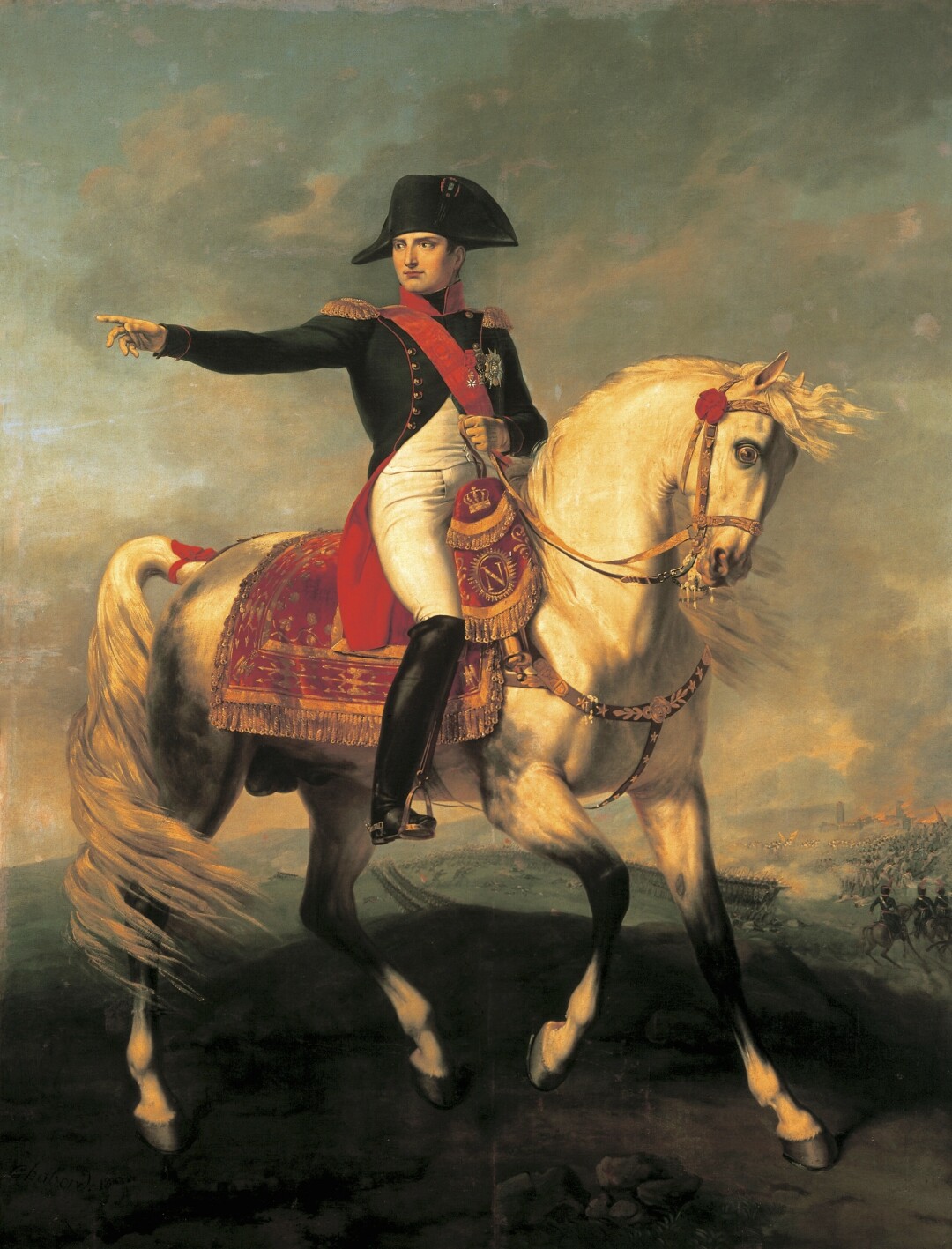Two examples of silly math

How many of Napoleon’s hats will save Planet Earth for Homo Sapiens?
Before I get into this week’s subject of why we need to double the number of college majors in English and Humanities if we are going to save Planet Earth for our grandchildren, I must admit I have a passing interest in mathematics. I think I was hooked on math statistics when I read there were 635,013,559,600 hands I could be dealt if I played Bridge for my lifetime. I have played a lot of Bridge in 60 years, and I don’t think I have ever been dealt the same hand twice.
This week I have been concerned about statistics in the “real” news. For years climate-change scientists have been warning that if we exceed an increase of 1.5 Celsius by 2050, much of the earth will not be habitable. One day this week, for the first time in Homo sapiens history, the world averaged more than a 2C increase from the average. Thousands of humans around the earth died of extreme heat this week. God must have been in air-conditioned Heaven to miss it.
West Virginia Senator Joe Manchin is not running for re-election in 2024. West Virginia Governor Jim Justice will probably replace him. Manchin got rich owning a coal company while voting against any Democratic bill that restricted the burning of coal. Justice has a different view: “God will give us time for the smart people of the world to solve the riddle. If there is truly climate change going on, He will give us time.” He must be referring to the perfect God who created the perfect Adam and Eve but failed to create perfect pregnancies that produced perfect babies from fertilized eggs at perfect conceptions. Oh well, that’s another story.
Why do emperors and billionaires never know when enough is enough?
Napoleon has been in the news lately because of a movie about his life in wars and with Josephine. A number stood out in the news story: $2.1 million. A-wish-to-remain-anonymous collector paid that sum for a bicorn hat believed to have been worn by the 19th Century French emperor.
Nappy had 120 two-cornered military dress hats made to wear with 120 different military uniforms. Four hats have been purchased by private collectors and many have been displayed in government museums. Being 100% French, I have been a sucker for French news much of my life. But why did Louis XIV need a thousand wigs and Napoleon 120 different military uniforms and 120 two-cornered hats?
The UN is meeting in the United Arab Emirates this week for another crucial session about how the countries of the world can reduce climate change. Scientists have determined the planet and Homo sapiens can survive if we limit temperature increase to 1.5C. The problem is the world is on track to hit 3C in the 21st Century. The chances are slim to none that billionaires with superyachts and greedy oil companies will understand when enough is enough—and Slim has already paid Elon Musk $55 million to fly him to the moon.
The Monaco Yacht Show sale is going on where billionaires trade in yachts for superyachts and lucky multi-millionaires buy their first yachts. By September there were more than 100 superyachts parked in the harbor, many with submersibles, helicopters, swimming pools, basketball courts, and every kind of water “toy” known to man. Some of the superyachts are worth more than many small island states. Two out of three Monaco residents are millionaires. A Guardian newspaper reporter could not find a single customer who expressed an interest in the fact the world’s climate was changing because of the excessive use of fossil fuels. I wonder if any of the world’s 1750 billionaires have college majors in English, languages, art, humanities, music, and history. In these fields you have to begin to have some feelings, empathy, and respect for your fellow human beings if you have an IQ over 75.
I have been reading Guardian columnist Rebecca Solnit for years. She does not mince words about the rich: “The rich are bad for the Earth, and the richer they are the bigger their adverse impact (including the impact of money invested in banks, and stocks financing fossil fuels and other forms of climate destruction). In other words, we are not all the same size. Billionaires loom large over our politics and environment in ways that are hard to understand without taking on the shocking scale of their wealth. That impact, both through their climate emissions and their manipulations of politics and public life means they are not at all like the rest of humanity. They are behemoths, and they mostly use their outsize in ugly ways—both in how much they consume and how much they influence the world’s climate response.”
Amen.
We even need art historians to avoid unstable societies, class riots and wars
Years ago, when President Barack Obama was musing about how to have the nation recover from George W. Bush’s recession of 2000, he said perhaps we had enough art historians, so we should spend money on “real stuff.” Humanities and art professors jumped all over him because they knew that collecting and restoring art kept us from repeating “ugly” history. A reporter asked him if he had ever seen Pablo Picasso’s painting “Guernica” of the Spanish Civil War. It is a 11.5 ft. by 25.6 ft. painting of a small town hit by the violence and terror of the Spanish Civil War in 1936-1939. It featured a gored horse, a bull, screaming women, a dead baby, a dismembered soldier, and lots of flames. It became world famous. It is exhibited in a museum in Madrid, and millions of copies have been printed.
The American Academy of Arts and Sciences, founded in 1780, has tracked the jobs and incomes of humanities majors for many years and has proven humanities majors are generally satisfied with incomes and jobs and employed in supervisory roles as often as graduates of other majors. It does independent research in many disciplines, professions and perspectives to address significant challenges to the country. This is its mission statement: “The AAAS honors excellence and convenes leaders from every field of human endeavor to examine new ideas, address issues of importance to the nation and the world, and work together to cultivate every art and science which may tend to advance the interest, honor, dignity, and happiness of a free, independent, and virtuous people.”
It is committed to the following values: (1) Advancing the common good, (2) Upholding democratic ideals, (3) Elevating the use of evidence and knowledge, (4) Fostering deliberative discourse, (5) Preserving independence, (6) Embracing diversity and inclusivity, and (7), Celebrating excellence. As you can see, it is not a popular Trumplican organization. I’m going to review my college and work record to prove a BA and BS in English and a M A Degree in Education and English literature can lead to leadership roles and a happy life.
Triple-tasking in classes, athletics, choir, throwing curves and working jobs
Although I was on numerous stages in the Midwest singing in a mixed quartet while Miss America BeBe Shopp was playing the vibraharp, I was recruited by Moorhead State Teacher’s College football and baseball coaches to knock opposing football players on their butts and strike out batters with my left arm. I never heard from the choir director. I was elected class president my freshman year, most likely because I had received publicity as the only freshman in the starting football lineup. Big deal. For some reason, I was the only jock in the college choir for four years. In my senior year I was co-captain of the football team and selected by league coaches on the All-Conference first team. Shortly after the football season ended, I was student director of John Van Druten’s play Bell, Book and Candle presented by the college theater group. It had been a big hit on Broadway in 1950. By that time, Corky, a Dragon cheerleader, and I were a “thing” on campus. She was one of the leads in the play.
In the spring I joined the baseball team in my fourth year as a starting pitcher. I was elected president of the student body and the Student Commission that directed and sponsored student activities. I was also selected to be in Who’s Who in American Colleges and Universities. By that time Corky and I sat by each other in the choir bus as we toured several high schools. Summers passed in a blur. I had joined the Marine Corps so I could be in a Platoon Leaders Class (PLC) program and graduate before going to Officer’s Candidate School (OCS). I spent much of one summer enjoying Marine Boot Camp at Parris Island, South Carolina. Other summers were spent making money: building metal storage buildings and barns for O’Day Equipment, pitching baseballs for Melroe Manufacturing and living in Gwinner before they built Bobcats, selling foot-long hot dogs and ice cream for a Fergus Falls concession firm on the carnival midways of dozens of county fairs, pitching for Gregory (near Little Falls!) and Gary, Minn., and other towns ($50 if I won, $20 if I lost), and spending the college years at the Frederick-Martin Hotel in Moorhead, working the counter in the Barn Restaurant. I also spent Christmas vacations working for the Fargo Post Office delivering mail on a northside Fargo route. God, it was great fun!
From the shores of new Topsail Island to Pelican Lake
After graduation from MSTC and Marine Corps Officer’s Candidate School at Quantico, Virginia, I was assigned to the Second Marine Division at Camp Lejeune, North Carolina for three years. I was commander of a heavy machinegun platoon, commander of a reinforced rifle company, battalion supply officer, and then regimental finance officer in that order from 1954 t0 1957. I had a six-month tour in Cuba, Puerto Rico, and the Dominican Republic where the division had training sites. That was before Castro. I watched Dictator Batista practice polo once.
After discharge as a captain (in case I would serve in a future war!), I went back to college for a MA teaching degree, thus, starting a 36-year career in education. I taught Senior English, Journalism, and Creative Writing at Fargo Central for eight years, then went into administration as director of personnel, Fargo South High principal, Horace Mann elementary, principal, director of human relations, and Fargo North High principal spread over 28 years. I also spent 28 years on both teacher and school board negotiation committees and served as chief spokesman for the school board negotiation committee for 11 years. I also taught NDSU doctoral candidates admin courses for three summers, and after retirement taught Concordia education majors for a semester after they had completed student teaching when a professor had a serious illness. I was elected to the Fargo Board of Education after I retired. It rounded out my experiences. I also enjoyed substituting for my kindergarten teachers at Horace Mann on occasion and teaching a Sixth Grade class Romeo and Juliet. I may be the only one to teach the full range of kindergartners through PHD level--while coaching the American Legion baseball “B” squad. That English major with a concentration in the humanities sure made my life interesting—to this very day.
